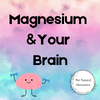
What does magnesium do for your brain?
, 4 min reading time

, 4 min reading time
Magnesium plays a crucial role in supporting nerve and muscle function, enhancing bone health, regulating blood pressure and blood sugar levels, and facilitating energy production. Research suggests it may also contribute positively to brain health, aiding in learning and memory while potentially reducing neuroinflammation and the degeneration of cognitive function.
Symptoms of magnesium deficiency can include muscle cramps or spasms, chronic fatigue or weakness, and heightened mood swings or irritability. If you’re experiencing these symptoms or have related health issues, it may be beneficial to increase your magnesium intake through dietary supplements.
To achieve optimal benefits for brain health, it’s important to choose high-quality magnesium supplements.
Magnesium is one of the most abundant minerals found in the body. It plays a big role in many different functions. For most it can support with muscle contractions in the heart. It can Synthesize proteins, assist in regulating blood sugar levels. It might Help control calcium levels inside cells. Most can say it supports energy production and maintains bone health. Transports electrolytes across the cell membrane
To ensure sufficient magnesium intake, it's important to incorporate magnesium-rich foods into your diet. Good sources include dark leafy greens, nuts, seeds, whole grains, and legumes. However, for individuals who struggle to meet their magnesium needs through diet alone, supplementation may be beneficial. High-quality magnesium supplements are available in various forms, such as magnesium citrate, glycinate, and oxide, each with different absorption rates and effects.
As with any supplementation, it is crucial for individuals to consult healthcare professionals to determine the appropriate dosage and formulation of magnesium that best suits their needs. Different forms of magnesium, such as magnesium citrate or magnesium glycinate, may have varying effects and bioavailability, making personalized recommendations essential.
How can magnesium improve your brain health?
Magnesium is vital for the proper functioning of neurons and the regulation of neurotransmitters, which facilitate communication between brain cells. It plays a key role in managing the neurotransmitter glutamate, and when glutamate levels become unbalanced, it can lead to nerve cell damage or death, contributing to conditions such as Alzheimer’s, Parkinson’s, and Huntington’s disease.
Recent studies have uncovered additional health benefits of magnesium. A review by the NIH indicated that magnesium can enhance learning and memory in animal models with brain injuries, showing significant improvements in cognitive performance. Further research suggests that these effects may extend to humans as well.
A 2023 study found that magnesium can play a significant role in reducing neuroinflammation, a condition often associated with various neurodegenerative diseases such as Alzheimer’s, Parkinson’s, and multiple sclerosis. Neuroinflammation occurs when the brain's immune system becomes activated, leading to chronic inflammation that can damage neurons and disrupt normal brain function. This study suggests that magnesium’s anti-inflammatory properties may help to mitigate this harmful process, potentially slowing the progression of these debilitating conditions.
The research highlights the mechanisms by which magnesium exerts its effects on neuroinflammation. Magnesium is known to regulate several biochemical pathways that control inflammation and immune responses in the brain. By modulating the activity of certain inflammatory markers and cytokines, magnesium can help maintain a healthier balance within the brain's microenvironment. This balance is crucial for preserving neuronal health and function, reducing the risk of cognitive decline associated with chronic inflammation.
Furthermore, the findings indicate that regular magnesium supplementation may provide protective benefits for brain health over time. For individuals at risk of neurodegenerative diseases or those experiencing early signs of cognitive decline, incorporating magnesium supplements into their daily regimen could be a proactive strategy. The study suggests that achieving optimal magnesium levels may enhance neuroprotection and support cognitive functions, such as memory, attention, and overall mental clarity.
A few other foods you might consider are yogurt and milk, tofu, and potatoes with the skin on. Questions about magnesium often arise, particularly regarding its types and benefits for brain health. Magnesium L-threonate is recommended for this purpose, as it may help individuals dealing with depression, Alzheimer’s disease, and age-related memory loss. Conversely, certain types of magnesium should be approached with caution; magnesium carbonate, gluconate, chloride, and oxide are known to potentially cause diarrhea and other digestive issues. For those looking to increase their magnesium intake through diet, several foods are particularly rich in this essential mineral. Dark leafy greens, such as spinach and kale, are excellent sources, along with nuts and seeds like almonds, cashews, and pumpkin seeds. Whole grains, including brown rice and oats, also contribute to magnesium levels. Additionally, fatty fish like salmon and halibut, as well as fruits such as bananas, avocados, and figs, are good options. Surprisingly, dark chocolate made with 70% or more cocoa is another delicious source of magnesium!
*Always consult with a healthcare expert before you start or stop any medication, vitamin or supplement.
Interested in learning more? Stop by our store or visit our website for to see all of our magnesium products or any other supplement you might be interested in! We carry a large selection on Organic Supplements, Natural Health Supplements, Organic Vitamins, and Herbal Supplements!
Stay in touch! Join our mailing list to stay up to date with promotions, sales, events and new products!



